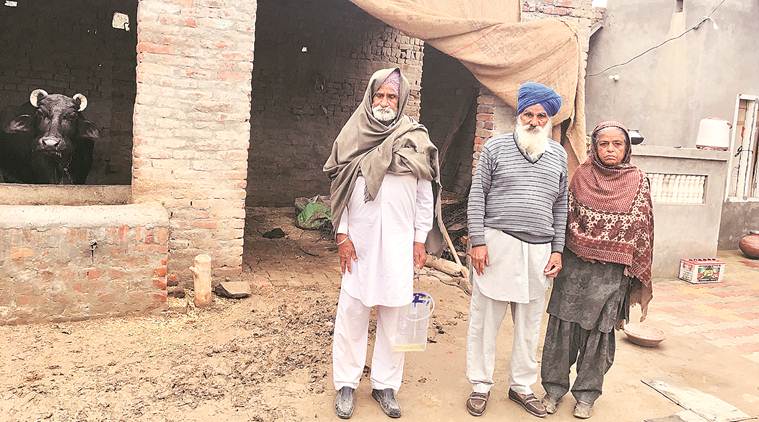- India
- International
Defaulting Punjab farmers face jail as banks file criminal cases
All the farmers who faced criminal action for defaulting on loans say they were made to sign on blank cheques.
 Ujagar Singh (centre) with wife and brother. (Express photo by Anju Agnihotri Chaba)
Ujagar Singh (centre) with wife and brother. (Express photo by Anju Agnihotri Chaba)
“If you write about our plight, will the government stop banks from sending us to jail?,” asks Ujagar Singh.
The 60-year-old from Jhumba village in Bathinda district is among scores of Punjab farmers who have been convicted or are facing trial in criminal cases of cheque-bouncing filed by banks under Section 138 of the Negotiable Instruments Act, 1938 (NIA). The bulk of these cases involve small and marginal farmers who qualify for the state government’s loan waiver scheme.
On February 8, a local district court sentenced Ujagar, who owns 2.75 acres, to 18 months of rigorous imprisonment in two cases — the first one filed on February 2, 2016, by the Bathinda District Central Cooperative Bank for non-repayment of a crop loan of Rs 2,30,800 sanctioned in 2011, and the second filed on March 3, 2016, by the Punjab State Cooperative Agricultural Development Bank against a
Rs 3.3 lakh loan taken for purchase of a Tata Xenon pick-up vehicle in 2013.
“I was paying interest against the loan till 2015, when my entire cotton crop was eaten by chitti makhi (whitefly pest). Even on the vehicle loan, which I took hoping to earn some extra income, I didn’t default for the first two years,” says Ujagar, adding that both banks took signed blank cheques from him. “I signed on them without knowing that these would one day turn into hathkadi (handcuffs) for me,” he adds.

Read | In Kerala district hit by floods, five farmer suicides since January
Ujagar, who lives in a semi-built three-room house with six members of his family, including a brother with a serious kidney ailment, and three buffaloes, is currently on bail, for which he had to furnish two personal bonds of Rs 30,000 each. “This is only a temporary relief. In the next few months (when his appeal comes up before the district sessions court), I will definitely have to go to jail,” notes Singh, who also has debts of over Rs one lakh with the local arhatia (trader/commission agent).
Buta Singh Burjgill, president of the Bhartiya Kisan Union (Dakunda faction), says that over the last one year, “thousands of farmers” have been issued legal notices by banks by using the blank cheques they got farmers to sign on at the time of granting crop loans. “These days, banks have been taking triple securities from farmers — pledging of land, signing by a guarantor and blank/post-dated cheques – while the RBI has asked banks to extend collateral-free agricultural loans of up to Rs one lakh. That limit has been raised to Rs 1.6 lakh in the Interim Budget,” he says.
But all the farmers who faced criminal action for defaulting on loans say they were made to sign on blank cheques.
Gurpreet Singh, 45, spent two months in jail before coming out on bail in June last year. This 3.5-acre farmer from Kishangarh village of Moga’s Nihal Singh Wala tehsil was, on March 20 last year, awarded rigorous imprisonment for two years for defaulting on a Rs 5.6-lakh crop loan availed from SBI more than a decade ago. “As I had an SBI account, they took blank unsigned cheques from me,” says Gurpreet.
Gurpreet’s balance principal amount of Rs. 2.7 lakh, along with the unpaid accrued interest, has since grown to around Ra. 12 lakh.
In 2015, SBI filed a case of non-repayment, invoking Section 138 of NIA 1881. The loan was against the security of land that was in my father’s name. As I had an account with SBI’s branch, they also procured blank unsigned cheques from me. They ensured that one of those cheques bounced,” states Gurpreet, who did not apply for bail when the sentence was pronounced. He was, then, arrested on May 1, 2018 and came out of jail only by June-end after his application was moved. But the respite may not last long, as his appeal is due on February 28 and “bank wale kehndeme ki mainu jail bhej ke hi chhadange (the bank people are threatening they will surely send me to jail,”.
Gurpreet, during a recent National Lok Adalat (alternative dispute resolution forum), was given an opportunity to settle his Rs 12 lakh dues for a one-time payment of Rs 6.5 lakh. “From where can I pay Rs 6.5 lakh? Forget waiving my loan (owning less than 5 acres makes him a “small farmers”), why can’t the government at least direct the bank not to treatme like a criminal?”, he points out.
40-year-old Mamta Rani, from Kanakwal Bhanguan village in Sangrur district’s Sunam tehsil, paid Rs 4,000 to a lawyer to take anticipatory bail in October 2018 on a cheque bouncing case filed by the PSCADB. The Class12-pass, mother-of-two has no money to further fight the case still being heard at the sub-divisional judicial magistrate’s court at Sunam.
“I know it is going to be one-sided and will be decided against me. The bank officials are saying they will paste a photo of mine in their premises,” complains Rani, who took a Rs 3 lakh loan for four years in 2013 to buy three Holstein Friesian cows and one Murrah buffalo. “I wanted to supplement our income, as we have just one acre of land and my husbandis only a driver. But the cows did not yield enough milk and were also too costly to maintain. I paid my six-monthly instalments of Rs 15,000 for the first two years, but couldn’t sustain it. That was when they filed this caseand loan amount itself has multiplied to Rs 6.4 lakh”, she adds.
The prospect of going to jail even at 80 does not seem to, however, deterBagga Singh, who, on December 10, was sentenced to 18-months rigorous imprisonment by the chief judicial magistrate’s court at Bathinda against a Section 138 case filed by the district central cooperative bank. The four-acre farmer from Muhalan village was, until 2015, making regular payments against his Rs 4.50 lakh crop loan limit extended in 2013. A price crash in cotton in 2015, followed by a severe whitefly infestation, led to his missing two instalments. In his case, too, the bank had obtained blank cheques. “Being angutha chap (illiterate), I gave my thumb impression on whatever paper the bank people had given. Now, I leave everything to waheguru (God),” says Bagga, who was granted a spot bail by the sessions court after his lawyer filed an appeal.
According to Sukhdev Singh Kokri Kalan, general secretary of BKU’s Ugrahan faction, in the past, whenever farmers ran into repayment problems with banks, the cases were resolved through civil procedure. “But now, even public sector and cooperative banks are increasingly initiating criminal proceedings against farmers,” he says.
A public sector banker, who did not want to be quoted, admits to the practice of obtaining blank cheques as security for farm loans. He, however, attributes it to the Punjab government’s loan waiver scheme and its decision to ban ‘kukri’ or the auction of mortgaged land to recover loans. “What is happening is unfortunate. But if loans are waived and kukri is not allowed, and the government also wants us to lend more to farmers, what are we supposed to do?” he asks.
Punjab Cooperation Minister Sukhjinder Singh Randhawa said they would take up the matter of blank cheques with banks. “We will order an inquiry to check this practice and return the blank cheques that banks took from farmers.”
Apr 24: Latest News
- 01
- 02
- 03
- 04
- 05






































